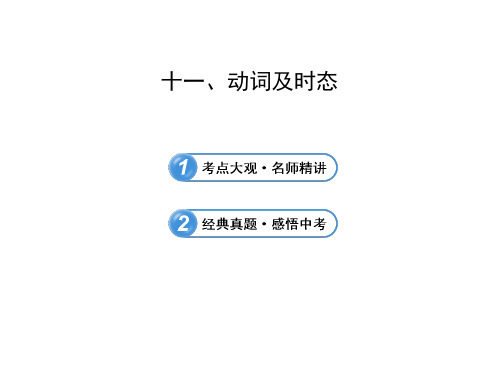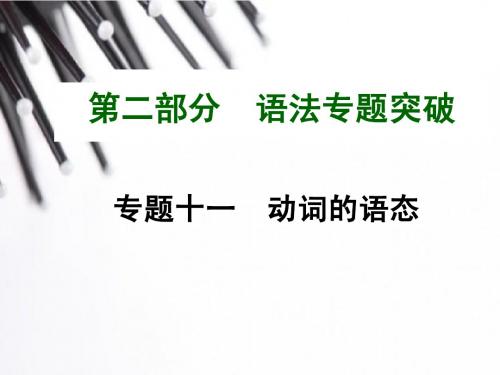中考英语总复习语法专项复习语法十一动词的时态及语态课件(送十三个语法专题)
合集下载
初中英语语法动词及时态ppt课件

过去进行时 主语+was/were+v. -ing+其他
现在完成时 主语+have/has+过去分词+其他
中学阶段见到的其他时态 时态
构成
过去完成时 主语+had+过去分词+其他
过去将来时
现在完成 进行时
主语+would+动词原形+其他 主语+was/were going to+动词原形
主语+have/has+been+现在分词+其他
状语
【温馨提示】
(1)在含有时间状语从句的复合句中,延续时间较长的动作用过 去进行时,另一个短暂性动作用一般过去时。例如:
My pen dropped on the ground when I was walking in the park. 在公园散步的时候,我的钢笔掉到地上了。
(2)表示两个延续性动作在过去某一时刻同时进行,不考虑动作 的先后顺序,主句和从句的谓语动词都用过去进行时,连词常 用while。例如:
词
宾语,又分为及物动词和 不及物动词。
物动 run , walk , cry , 词 swim,fall,happen
连
系 连接主语和表示主语身份、be , seem , look , become ,
动
性质、状态的动词称为连 get , grow , feel , appear ,
系动词。
turn
day等频率副词或时间状语 month.
连用
我们每月都去看望刘叔叔。
用法
例句
表示客观事实或普遍真理 The sun rises in the east. 太阳在东方升起。
中考英语语法专题讲解——时态 (共31张PPT)

We are leaving for Shanghai.
The bus is coming soon.
③ 常与现在进行时连用的时间状语和标 志词有:now, these days, look, listen等。
①表示发生在过去的或已经完成的对现在仍有 影响的动作。
I have lost my key.
①表示现在或者现阶段正在进行的动作或持续 的状态。
They are singing in the next room now.
The students are working on the farm these days. ②现在进行时表示将来的动作,这种结构的动 词有:go, come, start, begin, arrive, leave等, 表示即将发生的动作或者安排好要做的事情。
He had finished his homework before he went to bed.
②常与过去完成时连用的时间状语有:by last week, by the end of last year。
Just as I got to the school gate, I realized I had left my book in the cafe.
Will you be back in two days?
Where shall we meet tomorrow? 注意:“will+动词原形”还可以表示愿意做某 事或者客观性的将来。
We will help him if he asks us.
The sun will rise at 6:00 tomorrow morning.
③ go, come, leave, arrive, start等动词的过去进行时 表示过去按计划即将发生的动作。
The bus is coming soon.
③ 常与现在进行时连用的时间状语和标 志词有:now, these days, look, listen等。
①表示发生在过去的或已经完成的对现在仍有 影响的动作。
I have lost my key.
①表示现在或者现阶段正在进行的动作或持续 的状态。
They are singing in the next room now.
The students are working on the farm these days. ②现在进行时表示将来的动作,这种结构的动 词有:go, come, start, begin, arrive, leave等, 表示即将发生的动作或者安排好要做的事情。
He had finished his homework before he went to bed.
②常与过去完成时连用的时间状语有:by last week, by the end of last year。
Just as I got to the school gate, I realized I had left my book in the cafe.
Will you be back in two days?
Where shall we meet tomorrow? 注意:“will+动词原形”还可以表示愿意做某 事或者客观性的将来。
We will help him if he asks us.
The sun will rise at 6:00 tomorrow morning.
③ go, come, leave, arrive, start等动词的过去进行时 表示过去按计划即将发生的动作。
初中英语中考复习时态讲解课件(共79张ppt)

一般现在时
1. 表示经常性或习惯性的动作
She does excersice everyday.
真题链接
—What do you often do at weekends?
—I often ____ my grandparents.
A. visit
B. visited
C. have visited D. will visit
Just a moment, I am washing dishes.
when
习题
Just a minute! My brother________ his car in the garden. A. washes B. is washing C. washed D. will wash
习题
---Hey, Tom. Let’s go swimming.
动词过去分词 不规则变化
speak hear see give build swim buy teach
spoken heard seen given built swum bought taught
现在完成时
already yet
1.过去发生或已完成的某一动作对现在的影响。
I have already watched this film. I haven't watched this film yet. I have already visited America. I haven't visited America yet.
A. prepares
B. is preparing
C. has prepared D. prepared
真题链接
--Mum, it's late. Why are you still here? --Dad hasn't come back yet. I ____ for him. A. am waitingB. was waiting C. waited D. had waited
中考动词时态专题复习 PPT

---Alice, why didn’t you e yesterday? ---I _____, but I had an unexpected visitor、 A、 had B、 would C、 was going to D、 did ②be going to 可用来表达某种迹象要发生得事。而will 不
中考动词时态专题复习
动词
动词得分类
谓语动词
时态、语态 虚拟语气
不定式
非谓语动 词
动名词
分词
现在分词 过去分词
时
态
定义: 在英语中,不同时间发生得
动作要用不同得动词形式来表 示,这每一种不同得形式就叫做时态。
时态
• 一般现在时 • 一般将来时 • 一般过去时 • 现在进行时 • 现在完成时 • 过去进行时 • 过去将来时 • 过去完成时
1) clean -> cleaning 2) 以不发音“e”结尾得,去掉字母“e”,再加ing
make -> making
3) 重读闭音节得单词,双写最后一个字母,再加ing
swim -> swimming
过去进行时
1. 指在过去得某一个时间正在发生得动作。 2. 时间状语
1) at this time yesterday
They have cleaned the classroom、(They cleaned the classroom and the classroom is clean now、)
2、 表示过去已经开始,持续到现在而且可能继续 下去得动作状态。
He hasn’t given me any more trouble since then、
stop -> stopped
中考动词时态专题复习
动词
动词得分类
谓语动词
时态、语态 虚拟语气
不定式
非谓语动 词
动名词
分词
现在分词 过去分词
时
态
定义: 在英语中,不同时间发生得
动作要用不同得动词形式来表 示,这每一种不同得形式就叫做时态。
时态
• 一般现在时 • 一般将来时 • 一般过去时 • 现在进行时 • 现在完成时 • 过去进行时 • 过去将来时 • 过去完成时
1) clean -> cleaning 2) 以不发音“e”结尾得,去掉字母“e”,再加ing
make -> making
3) 重读闭音节得单词,双写最后一个字母,再加ing
swim -> swimming
过去进行时
1. 指在过去得某一个时间正在发生得动作。 2. 时间状语
1) at this time yesterday
They have cleaned the classroom、(They cleaned the classroom and the classroom is clean now、)
2、 表示过去已经开始,持续到现在而且可能继续 下去得动作状态。
He hasn’t given me any more trouble since then、
stop -> stopped
2015中考英语(人教)语法专题复习:专题十一 动词的语态(共24张PPT)

对象)。
在下列两种情况之一要用被动语态:
1. 不知道或没有必要说明动作的执行者是谁, 用被动语态。 如:Rice is grown in the south of China. 中国南 方种水稻。
2. 没有必要指出谁是动作的执行者,用被动语
态。 如:Your work must be finished today. 你们的工 作必须今天完成。
考点三 主动形式表示被动意义的情况 1.某些由及物动词转化而来的不及物动词。 如:read, write, clean, wash, draw, cut, open, sell 等,常与副词 well, easily, smoothly 等连用,且通常 用主动结构表示被动意义。 如:The pen writes well.这支钢笔很好用。
【 解析 】考查一般过去时的被动语态。句意为 “你知道谁发明了电话吗?”“不知道,我只 知道它在1876_____年。” invented为一般过去 时 的 主 动 语 态 , 是 invent 的 过 去 式 ; was invented 为一般过去时的被动语态; invents 为
一般现在时的单三形式。从句子上下文可知,
will/shall do
will/ shall+ be+done
年各1次)
过去将来时(2012
年1次)
含情态动词(2014
would do
would +be+done
年,2013年各1次、
2012年2次)
情态动词 +do
情态动词+be+ done
(1)转换图示:
口诀:宾变主,主变宾,谓语动词用被动。
③将主动语态的主语改为by...放在谓语动词后。 注意:如果原主语是代词,则应由主格变为宾格。 如: He sang a song . → A song was sung by
在下列两种情况之一要用被动语态:
1. 不知道或没有必要说明动作的执行者是谁, 用被动语态。 如:Rice is grown in the south of China. 中国南 方种水稻。
2. 没有必要指出谁是动作的执行者,用被动语
态。 如:Your work must be finished today. 你们的工 作必须今天完成。
考点三 主动形式表示被动意义的情况 1.某些由及物动词转化而来的不及物动词。 如:read, write, clean, wash, draw, cut, open, sell 等,常与副词 well, easily, smoothly 等连用,且通常 用主动结构表示被动意义。 如:The pen writes well.这支钢笔很好用。
【 解析 】考查一般过去时的被动语态。句意为 “你知道谁发明了电话吗?”“不知道,我只 知道它在1876_____年。” invented为一般过去 时 的 主 动 语 态 , 是 invent 的 过 去 式 ; was invented 为一般过去时的被动语态; invents 为
一般现在时的单三形式。从句子上下文可知,
will/shall do
will/ shall+ be+done
年各1次)
过去将来时(2012
年1次)
含情态动词(2014
would do
would +be+done
年,2013年各1次、
2012年2次)
情态动词 +do
情态动词+be+ done
(1)转换图示:
口诀:宾变主,主变宾,谓语动词用被动。
③将主动语态的主语改为by...放在谓语动词后。 注意:如果原主语是代词,则应由主格变为宾格。 如: He sang a song . → A song was sung by
中考专题复习---动词的时态和语态ppt课件

times a day , etc
.
6
一般现在时用法
习惯活动 I get up at six every morning.
现在情况
They are very busy. He needs help.
客观事实 主将从现
The moon moves around the earth.
We’ll go there if it doesn’t rain. He’ll call you when he arrives. -
概念:表示将来某个时间要发生的动 作或存在的状态
构成形式 :1. will/shall+do
2. am/is/are going to+do
3. am/is/are + doing
常用时间状语 :
tomorrow, in three days,this…,
next…, soon, etc. .
18
一般将来时用法 将来状态 There will be rain tomorrow. 将来活动 What are you going to do next
weekend?
主将从现 I will call you as soon as I get
there tomorrow morning.
现进表将 The bus is coming.
.
19
一般将来时的注意点:
Look at the dark clouds, it _is__g_o_in_g__to_rain. Tomorrow ___w_i_ll__ be April Fool’s Day.
C. wrote D. was writing
2. _W__h_il_e_Jim was making a paper plane ,
2023年中考英语专题复习--动词的语态课件(26张PPT)

—No, it _C____. That’s one of the school rules.
A.doesn’t allow
B.wasn’t allowed
C.isn’t allowed
—yes. it __A___ in beijing successfully and all the
chinese people were proud of it.
a.was held
b.is held
c.will be held
16.—Can you take your phone to school?
Why not join us? —Thank you. I’d love to but I __C___ that movie
twice. A.will watch C.have watched
B.watched
12. In 1958, pinyin ___D_____ by Chinese linguist(语言学
主动语态与被动语态的区别
2.被动语态
不使用被动语态的情况
1) 不及物动词(短语):happen、take place 、break out、rise、 belong to、 come true、 fail、 appear等
2)主动形式表达被动意义
系动词:The apple smells sweet. 说明事物本身性质的动词:wash、sell、read、write等。 The pen writes well. need/require+doing/to be done:My car needs repairing.
主动语态变被动语态
2.被动语态
• 被动语态的结构 • 一般现在时:am/is/are+done • 一般将来时:will/shall +be done; am/is/are going to +be done • 一般过去时:was/were +done • 情态动词的被动结构:情态动词+be+done
中考英语总复习 语法专项复习 语法十一 动词的时态与语态课件

A.easily influences
B.easily influenced
C.are easily influenced D.will be easily influenced
第二十六页,共三十四页。
2.(2018·安徽合肥(héféi)庐阳二模)All the people I have known in
all the seven works twice.
A.am reading
B.read
C.have read
D.had read
第二十页,共三十四页。
9.(2018·甘肃白银(báiyín)中考)She
I came in.
A.reads
B.had read
C.will read
D.was reading
第三页,共三十四页。
2.一般过去时 表示过去发生的动作。be动词的一般过去时为was, were;
实意动词的一般过去时为动词的过去式。常与just now, yesterday, last week, ago等表示过去的时间状语连用。
Who did you see at the meeting yesterday?你在昨天的会议(huìyì)上看
the earth
from the west to the east.
A.moved
C.moves
B.moving D.move
第十九页,共三十四页。
8.(2018·江西(jiānɡ xī)宜春4月模拟)—How do you like Harry Potter?
—It's so interesting that I
A.go
B.went
C.will go
